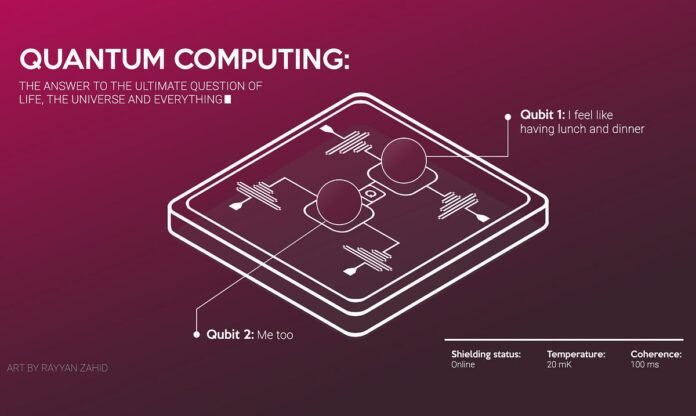Computing has evolved tremendously over the past few decades. From large mainframe computers to personal computers, laptops, tablets, and smartphones, computing has become an integral part of our daily lives. With the rise of artificial intelligence (AI) and big data, computing is becoming more complex, and traditional computers are reaching their limits. Quantum computing is the next step in the evolution of computing, and it has the potential to unlock a new era of innovation.
Quantum computing is a new way of computing that is based on the principles of quantum mechanics. It is a radically different approach to computing, and it promises to solve problems that are beyond the reach of classical computers. Quantum computers use qubits instead of bits, and they can perform multiple calculations simultaneously. This makes them much more powerful than traditional computers, and they can solve problems that would take classical computers millions of years to solve.
In this article, we will explore the basics of quantum computing, its potential applications, and the challenges that need to be overcome to unlock its full potential.
What is Quantum Computing?
Quantum computing is a type of computing that uses the principles of quantum mechanics to perform calculations. Traditional computing is based on classical physics, which uses bits to represent information. A bit can have a value of either 0 or 1, and it is the smallest unit of information in classical computing. Quantum computing, on the other hand, uses qubits to represent information. A qubit can have a value of 0, 1, or both at the same time. This property is called superposition, and it is what makes quantum computing so powerful.
Another property of qubits is entanglement. When two qubits are entangled, their states become correlated, even if they are separated by large distances. This property is what enables quantum computers to perform calculations much faster than classical computers.
The basic building blocks of a quantum computer are qubits. These qubits can be realized using different physical systems, such as superconducting circuits, trapped ions, and photonic systems. Each physical system has its advantages and disadvantages, and researchers are exploring different approaches to build a practical quantum computer.
Quantum Algorithms
One of the most exciting aspects of quantum computing is its ability to perform calculations that are beyond the reach of classical computers. Quantum algorithms are algorithms that take advantage of the properties of quantum mechanics to perform calculations that would be intractable for classical computers. One example of a quantum algorithm is Shor’s algorithm, which is used to factor large numbers.
Factoring large numbers is a hard problem for classical computers because it requires a lot of computational resources. Shor’s algorithm, on the other hand, can factor large numbers much faster using a quantum computer. This has significant implications for cryptography because many cryptographic algorithms rely on the difficulty of factoring large numbers.
Another example of a quantum algorithm is Grover’s algorithm, which is used to search an unsorted database. Grover’s algorithm can search an unsorted database with N items in O(sqrt(N)) time, which is much faster than the O(N) time required by classical algorithms.
Potential Applications
Quantum computing has the potential to revolutionize many fields, from cryptography and finance to drug discovery and material science. Here are some potential applications of quantum computing:
- Cryptography: As mentioned earlier, Shor’s algorithm can factor large numbers much faster than classical computers. This has significant implications for cryptography because many cryptographic algorithms rely on the difficulty of factoring large numbers. Quantum computers could potentially break many of the encryption schemes that are currently used to protect sensitive information.
- Finance: Quantum computing could be used to optimize portfolios and perform risk analysis. Quantum computers could also be used to solve complex optimization problems, such as the traveling salesman problem, which is used to find the shortest route that visits a set of cities.
- Drug Discovery: Drug discovery is a complex process that involves screening millions of compounds to find potential drug candidates. Quantum computing could be used to simulate the behavior of molecules, which could lead to the discovery of new drugs much faster than classical methods.
- Material Science: Quantum computing could be used to simulate the behavior of materials, which could lead to the development of new materials with unique properties. For example, quantum computers could be used to simulate the behavior of superconductors, which could lead to the development of more efficient power grids.
- Machine Learning: Quantum computing could be used to improve machine learning algorithms by optimizing the training of neural networks. Quantum computers could also be used to perform unsupervised learning, which is a type of machine learning that doesn’t require labeled data.
Challenges
While quantum computing has tremendous potential, there are several challenges that need to be overcome to unlock its full potential. Here are some of the challenges facing quantum computing:
- Hardware: Building a practical quantum computer is a challenging task. The physical systems used to realize qubits are prone to errors, and the qubits need to be protected from environmental noise. Researchers are exploring different approaches to build a practical quantum computer, but there is still a long way to go.
- Scalability: Quantum computers are currently limited to a small number of qubits. To solve complex problems, quantum computers need to be scaled up to thousands or even millions of qubits. However, scaling up quantum computers is not as simple as adding more qubits. The quantum state of the qubits needs to be maintained, and the qubits need to be entangled in a way that doesn’t introduce errors.
- Algorithms: While quantum algorithms have shown great promise, there are still many open questions about their behavior. Researchers need to develop new algorithms that are robust to errors and can be implemented on practical quantum computers.
- Error Correction: Error correction is a critical aspect of quantum computing because qubits are prone to errors. However, error correction introduces additional overhead, which reduces the efficiency of quantum algorithms. Researchers are exploring different approaches to error correction, but there is still much work to be done.
Conclusion
Quantum computing is an exciting field that has the potential to revolutionize many fields, from cryptography and finance to drug discovery and material science. Quantum computers are fundamentally different from classical computers, and they can solve problems that are beyond the reach of classical computers. However, there are several challenges that need to be overcome to unlock the full potential of quantum computing. Researchers are exploring different approaches to build practical quantum computers, and they are developing new algorithms that can take advantage of the power of quantum computing. While quantum computing is still in its infancy, it has the potential to change the world in ways that we can’t even imagine.
Google News | Telegram
















